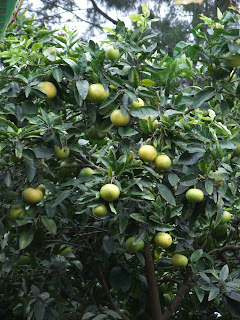So, why the reference to seasonal ingredients? Well, my favourite way to cook is to pull together whatever is fresh and at hand, thus inspiring me to create some kind of alchemical flavour bomb that feeds and nourishes.
This evening, while making one such bomb, I listened to a talk that alerted me to some fresh ingredients which I will soon bring to my public practice.
The talk was a conversation with Hakomi teacher Manuela Mischke-Reeds on "How Kindness and Body Wisdom Unravel Trauma Stories". Hakomi is a method that keeps making itself known to me. It originated with Ron Kurtz, who - among many other things - studied with Moshe Feldenkrais. It seems to me Ron Kurtz gathered some very potent ingredients.
I had my first Hakomi session with a friend the other day. He's training in the method; we've agreed to do swaps. As far as words go in describing it, Hakomi is an experiential form of psychotherapy - a form of psychotherapy that has every intention of inviting one's entire, embodied experience into the picture. And the magic ingredient is kindness.
This looks like one of the next places for my learning to go.
There were several things that really struck me about Manuela Mischke-Reeds' approach to trauma. Firstly, she described trauma as complete overwhelm which could result from a major event AND something that could accumulate over time.
In her words: "too much, too fast and no metabolising. The experience is too much for me to handle, it’s coming too fast and I have no way of metabolising - literally - physically, somatically, emotionally, spiritually. I cannot digest the experience." It broadens the way we think about trauma.
Metabolising. What an interesting word. Metabolising emotion. Metabolising spiritual experiences. Metabolising shock. Yes, how does one do that when the pace of life won't allow a moment's reflection?
Manuela brought into the discussion the experience through the media of being alerted to tragedy over and over, how this can be one such accumulation. Work is stressful. Someone is mean etc etc.
I began to see some of the unlikely (but, on reflection, obvious) ingredients that have informed me, and will inform my practice.
I worked in the media. I operated at the pace of the daily news cycle. My brain trawled for throwaway stories. My bosses pushed me to get the stories that would disturb people - both the readers and the players in the stories - which I found both impossible and futile.
It wasn't until I was in the real ratrace - living alone, catching a train to the city every day, working on a computer, communicating with people soaked in stress, firing off cortisol, pushing myself to meet deadlines, creating content that often was - again - futile, useless, unused. Serving egos that had no vision of where they were going, except up the career ladder - that ...
I burnt out.
Just before I stopped working, I asked my boss for emergency time off. It felt as though something was gaining on me and I could no longer outrun it.
Manuela described trauma as a "perceived threat to survival". That's what I was experiencing in many ways (I haven't fully described all of the ways, and all of the experiences that had accumulated, some more shocking and life-threatening than others). But just that daily grind was life-threatening. The attitudes I faced daily and the attitude I felt compelled to perpetuate to be in that environment were life-threatening.
It was lifeless.
Gradually I have come back to life. And, as a wise and unconventional psychologist once said to me, the way to do that was through my body.
I spent four years training in a professional Feldenkrais program, going through intensive periods in which I would go deep inside my experience of myself, my body, my feelings, thoughts, images, ideas, stories, attitudes. I've come out feeling as though I've been through a tumble dryer, wondering, WTF is the Feldenkrais Method? How am I going to practise it?
Well, that's the thing. I don't have to practise "IT". I will practise with all of the ingredients.
Through some guidance from a knowledgeable coach of healers and the like, I realised that the Feldenkrais Method is an ingredient. Just as my experience of jumping from the corporate ladder and running for my life is an ingredient. Just as my keen consumption of that talk tonight is an ingredient.
These are just several of countless ingredients that will come together in any given combination at any given time in service of healing and wholing whomever happens to be in the mix. And whatever is at hand, whatever is fresh, will inspire me to create some kind of alchemical flavour bomb that feeds and nourishes.

No comments:
Post a Comment